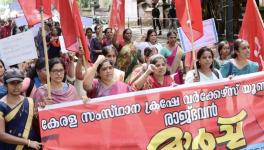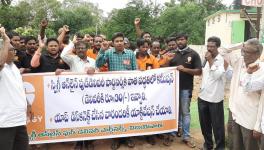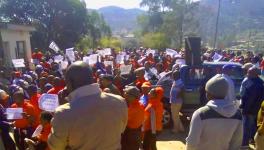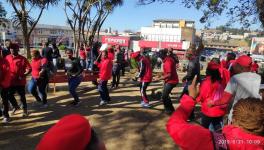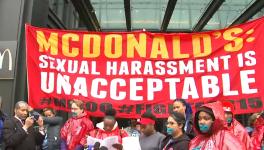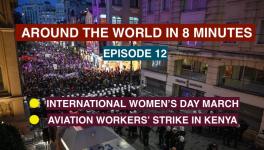Swaziland: Trade Unions Boycott King Mswati’s Businesses After Bar On Strike
Deputy Secretary General of the Swaziland National Union of Students (SNUS), Simphiwe Dlamini, giving a solidarity message to workers outside the industrial court. (Image: Peoples Dispatch/ Special Arrangement)
After the King Mswati III’s monarchical government of the Swaziland managed to stop what was expected to be the largest strike in recent times by getting the industrial court to deliver an order against it, the unions have resolved to appeal against the verdict and boycott all of the businesses owned by the King.
On January 28, the series of industrial actions that have been underway since mid last year was set to culminate in a massive strike by public servants. Nurses, teachers, non-teaching staff in government schools and accountants employed at government offices were all set to participate in the strike which was called in response to the government’s unwillingness to raise the salaries to offset the loss of purchasing power due to inflation.
While wages have not been renewed over the last two years, inflation and prices have been rising unchecked. This has been due to the decadence of King Mswati, the last absolute monarch in Africa, who recently spent around $74 million on his 50th birthday party.
The inflation thus induced has reduced the purchasing power of the public servants by 14.4% over a span of two years, as a result of which most of them “are now living far below the normal breadline”, said the Communist Party of Swaziland (CPS), in a statement.
“For two consecutive financial years”, CPS complained, “the government has maintained the ridiculous offer of 0.00 percent during negotiation processes, claiming that there is no money to pay for the increase, yet the funds to finance the royal family’s luxurious lifestyle are always available.”
The different unions which engaged in these failed negotiations were Swaziland National Association of Teachers (SNAT), the Swaziland National Association of Government Accounting Personnel (SNAGAP), the Swaziland Nurses Association (SNA) and the National Public Services and Allied Workers Union (NAPSAWU). Together, these unions – all of which are affiliated with Trade Union Congress of Swaziland (TUCOSWA) – represent 25,000 workers employed by the government.
Apart from the problem of salaries not rising with prices, which has uniformly affected all the professionals represented by these unions, severe underfunding of the public sector infrastructure has affected teachers and nurses in different ways.
While the teachers complain of being unable to cope with the burden imposed on them due to extremely high student to teacher ratio, the nurses complain about being unable to deliver proper care to their patients due to shortage of medicines. Further, lack of safety equipment, such as gloves and masks for example, leave them exposed to many diseases.
Large amounts of funds meant for schools and hospitals have been diverted into unbudgeted overseas trips and other indulgences of the King. And it is the accountants, represented by SNAGAP which had also joined the strike, who are used for this illegal diversion. “Strictly speaking, they find themselves having to choose between a rock and a hard place; release the funds illegally under Mswati’s command or refuse and thus join the close to 50 percent of the unemployed population,” CPS says.
When two years of negotiations with the government neither yielded any improvement of public sector nor provided respite for its workers, the unions, after having exhausted all other means, had decided to go on a strike last September.
The government, apart from unleashing its security forces against the workers, sought an order from the court to stop the strike and deem it illegal. The court, while recognising that the strike was legal, ordered that it had to be postponed until after November 23, in order to not have an effect during the election period (in a country where the monarchy has banned all political parties).
The unions then decided to hold the strike action in January this year and notified the government of the same, Njabulo Dlamini, international organiser for the CPS, told Peoples Dispatch.
Repression against preparatory meetings for the strike soon began. On January 11, two teachers affiliated with SNAT, which is the largest affiliate of TUCOSWA, were arrested while on the way to a union meeting.
Nevertheless, in the joint meeting of the unions on January 18, the date of the strike was finalised, and the government was notified that the strike will begin on January 28, should it fail to meet their demands for pay-rise, apart from other demands including increased funding for education and healthcare, removal of VAT on electricity, removal of taxes on benefits, and a ban on labour brokers and on 12-hour shifts without overtime pay.
The prime minister of the monarchy, Ambrose Dlamini, responded by threatening to fire the workers should they strike work and fine them E 10,000 ($761), in a country where 60% of the population earn less than E25 ($1.9) a day.
When the unions did not budge under this threat, which was coupled with intimidation by security forces, the king’s government moved the industrial court to give a verdict against the industrial action, despite the fact that the same court had previously held the strike as legal, and allowed it to be held anytime after November 23.
But even before approaching the court, the prime minister had himself declared the strike to be illegal. The court, Njabulo Dlamini said, was simply used to sanctify a decision already made by the government, rather than to assess the legality of the strike.
The strike was thus called off for now, and the representatives of the unions met on January 28 to discuss the way forward. After the meeting, the unions jointly resolved to appeal against the court’s ruling and boycott all of the businesses owned by the monarchy.
Get the latest reports & analysis with people's perspective on Protests, movements & deep analytical videos, discussions of the current affairs in your Telegram app. Subscribe to NewsClick's Telegram channel & get Real-Time updates on stories, as they get published on our website.









